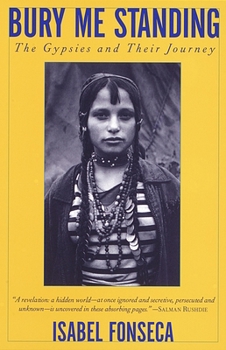Bury Me Standing: The Gypsies and Their Journey
Select Format
Select Condition 
Book Overview
A masterful work of personal reportage, this volume is also a vibrant portrait of a mysterious people and an essential document of a disappearing culture. Fabled, feared, romanticized, and reviled, the Gypsies--or Roma--are among the least understood people on earth. Their culture remains largely obscure, but in Isabel Fonseca they have found an eloquent witness. In Bury Me Standing , alongside unforgettable portraits of individuals--the poet, the...
Format:Paperback
Language:English
ISBN:067973743X
ISBN13:9780679737438
Release Date:October 1996
Publisher:Vintage
Length:352 Pages
Weight:0.74 lbs.
Dimensions:0.7" x 5.1" x 7.9"
Customer Reviews
5 ratings
BURY ME STANDING~THE PLIGHT OF THE ROMA
Published by Thriftbooks.com User , 17 years ago
Great read for anyone truly interested in Roma studies or serious enough to get beyond the bias stereotypes of "Gypsy fortunetellers, beggers, tramps and thieves". This book goes way beyond scratching the surface of the socio-political and economic issues facing the Roma in Europe in the past and on a daily basis. Isabella Fonseca relates her close and personal experiences among the Roma in various countries such as Poland, Romania, Hungary, Germany, Czechoslovakia, and some of the poorest countries of Europe. She also interviews many of the people she befriends and relates their experiences and treatment in the horrendous and unforgivable death camps of the Nazi's. No glamory here, the STARK truth. It will educate, shock and disturb you!
Beyond stereotypes
Published by Thriftbooks.com User , 23 years ago
This book opens with a chapter on the great Romany poet, Papusza (born as Bronislawa Wajs), which appeared earlier in The New Yorker. As Fonseca tells us, Papusza wrote a long autobiographical ballad about hiding in the forests during World War II--"Bloody Tears: What We Went Through Under the Germans in Volhynia in the Years 43 and 44." Discovered by the Polish poet Jerzy Ficowski in 1949, Papusza also wrote of the Jewish experience and "the vague threat of the gadjikane" (non-Gypsy) world." But her 1987 death in Poland, where she had lived most of her life, went unnoticed.That is an appropriate beginning, for this book is not academic anthropology--and it more than admirably explains, from the Roma point of view, what it means to live in a world that remains largely threatening to the Roma. The book is not uniformly complimentary. But Fonseca lived for a period with Roma families, learned their separate and distinct Romany language, traveled across Eastern Europe with them, observed the poverty-stricken ghettos and mud hovels in which the poorest made their beds. And one finds in her closeness to them a sympathy altogether lacking in many other works.Fonseca writes of her own extensive experience, of course, but also refers to more than 140 scholars, including the fine work of Rom professor Ian Hancock and Jan Yoors. The latter likewise lived among Roma, albeit during the pre-war and World War II eras. She recounts the likely path that the Roma traveled from India to Europe, their centuries of enslavement, their high rate of illiteracy (and cultural reasons for it), their experience during the Holocaust, which the Roma appropriately term the Devouring--and the new generation of Rom leaders who hope to lead their people to a more productive and accepted role in European and world society. For anyone who has ever wondered about the Rom--especially those wanting a portrait that moves beyond the stereotypes of literature and music like Carmen--this is a fine place to begin. Alyssa A. Lappen
Bold, highly creative, brilliant, fascinating
Published by Thriftbooks.com User , 23 years ago
Isabel Fonseca has endeavered on a fascinating task requiring mounds of research and spending hundreds of hours with Roma people. She constructs a brilliant, highly creative work documenting the struggles, challenges and life stories of Roma people in Eastern Europe. Fonseca looks beneath stereotypes to get at the truth.
An uncommon view into a secret people
Published by Thriftbooks.com User , 23 years ago
Isabel Fonseca does not write as an anthropologist; she has opinions, and is sometimes quite forthright about her negative feeling. She has documented her travels in Bulgaria and Albania, where she visits various Gypsy families in their shantytowns. The impoverishment of Albania is accentuated for the Gypsies, who traditionally shun education and a trade in favor of a nomadic existence. These semi-permanent Gypsies never merge with the people around them, instead staying separate and still abiding by cleanliness laws special to Rom culture. Even the more well-off Rom families live their own special way and stay remote from the world around them.Despite her lack of "objectivity" or perhaps because of it, Fonseca writes a compelling book about the daily live and struggles of Rom in various Eastern European countries. It can perhaps be compared to Oscar Lewis' Five Families, a well-known anthropological look at family life across economic levels in Mexico.
One of the best non-fiction books I've ever read
Published by Thriftbooks.com User , 27 years ago
I can't think of another non-fiction book that was worth staying up really late on a work night to finish reading -- but Bury Me Standing certainly earned that honor. Isabel Fonseca knows how to tell a gripping story that is full of sights and sounds and smells, making it read like a novel. She doesn't pull back on the realities of life as a "Roma" -- not a whiff of romanticism here, yet the book will make you feel for a people you may never even meet. The scholarship is deftly woven in with stories about real people that reflects the author's own rich experiences while researching the book. Much of the book takes place in this decade, too, making the plight of Europe's largest minority all the more timely a topic. You'll find out what the title means at the very end -- and it was well worth the wait






